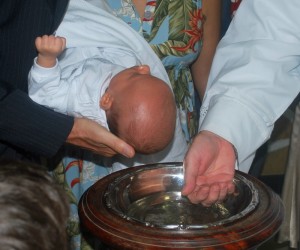 When I was about 15 or 16, I noticed a small black-and-white advertisement in the back of one of those now rapidly-disappearing oddities called a “magazine.” No, the ad wasn’t seeking mail-order brides or offering unmentionables to be shipped in brown-paper packages. It was an offer of a free correspondence course on Catholicism from the Knights of Columbus.
When I was about 15 or 16, I noticed a small black-and-white advertisement in the back of one of those now rapidly-disappearing oddities called a “magazine.” No, the ad wasn’t seeking mail-order brides or offering unmentionables to be shipped in brown-paper packages. It was an offer of a free correspondence course on Catholicism from the Knights of Columbus.
As an unbaptized “cultural Christian,” more or less, I only had a vague idea of what the Knights of Columbus was, but I was interested in the correspondence course. I had just finished reading The Great Controversy, Seventh-Day Adventist “prophetess” Ellen G. White’s black fable, published in the guise of a history of the Christian faith. You can guess the identity of the villain of that black fable, I’m sure.
Once the correspondence course arrived, I also received a catalogue of the Knights’ booklets on various aspects of the Catholic faith. Intrigued, I sent away for all of them. I treated those booklets like a cache of religious porn. Not only did I read them avidly, expecting more dark, dirty secrets of the type Ellen White had written about, but I took my pen to the pages, underlining passages and scrawling smart-aleck remarks in the margins.
What can I say? I was a kid. Thank God I got it out of my system before the Internet was invented.
I was reminded of this less than admirable episode from my youth today when I was reading a Traditionalist Catholic’s response to Pope Francis’s admonition to priests that they should not refuse baptism to anyone who asks for it. First, let’s look at a report of the Holy Father’s remarks, which he gave in a recent homily:
In words that may be interpreted to rebut Catholic priests who refuse to baptize children of same-sex couples, Pope Francis has said that priests should not refuse baptism to anyone who asks for the sacrament.
Speaking in a homily Sunday for the ordination of 19 new priests for the Diocese of Rome, Francis told the new ministers: “With baptism, you unite the new faithful to the People of God. It is never necessary to refuse baptism to someone who asks for it!”
I joked with friends on Facebook that we could expect “screams to begin in 5 . . . 4 . . . 3. . . .” And, sure enough, today I read a May 1 column on the Pope’s remarks by Christopher Ferrara, a lawyer who writes for Traditionalist Catholic outlets such as The Remnant and the late Fr. Nicholas Gruner’s Fatima Network. Ferrara opined:
Another day, another novelty from the lips of Francis. This time, in remarks following the ordination of new priests, he declared: “Do not ever refuse baptism to anyone who asks! (my emphasis)”
Never refuse baptism? Under any circumstances? That is hardly what the Church always taught before Francis. For example, in a 1980 Instruction on Infant Baptism, the Congregation for the Doctrine of the Faith stated that “infant baptism must be governed by two great principles, the second of which is subordinate to the first.” The first great principle, of course, is that “Baptism, which is necessary for salvation, is the sign and the means of God’s prevenient love, which frees us from original sin and communicates to us a share in divine life. . . .”
But the second great principle, which Francis would apparently ignore, is that: “Assurances must be given that the gift thus granted can grow by an authentic education in the faith and Christian life, in order to fulfill the true meaning of the sacrament.” Accordingly, “if these assurances are not really serious there can be grounds for delaying the sacrament; and if they are certainly non-existent the sacrament should even be refused.”
Notice all of Ferrara’s emphases? He underlines “ever” and “anyone” in the Pope’s statement. Then he underlines the points he’s dug up from a CDF document that he thinks refutes the Pope’s remarks. Much like my scribbles in the margins of those KofC booklets so long ago, where I used exclamation marks and proof-texts from my King James Bible to show why those wacky Catholics were so obviously wrong, Ferrara evidently thinks he has actually made a point here.
The problem is that Ferrara has completely missed the meaning of the one word he should have focused upon. That word is refuse. One online dictionary defines that word this way: “To indicate unwillingness to do, accept, give, or allow” or, to put it more simply, to deny outright, without qualification, or room for discussion or appeal. In the context of the Pope’s statement, the Pope is saying to priests that “It is never necessary to refuse [i.e., ‘deny outright’] baptism to someone who asks for it!”
What the Pope did not do was to suggest that there is never a reason to defer [i.e., postpone] baptism, when serious reason suggests a need, such as when there are legitimate concerns over whether the child to be baptized will be raised Catholic (or that an adult who requests baptism for himself will live as a Catholic, for that matter).
The 1983 Code of Canon Law—which, by the way, was promulgated after the CDF document that Ferrara cites—says:
For an infant to be baptized lawfully it is required . . . that there be a well-founded hope that the child will be brought up in the Catholic religion. If such hope is truly lacking, the baptism is, in accordance with the provisions of particular law, to be deferred and the parents advised of the reason for this (canon 868 §1 2°).
Nowhere in this canon are priests ever advised to outright refuse to baptize a child.
In a blog post I wrote for the Catholic Answers Blog on how to write rebuttals, I wrote:
Stephen R. Covey, the late educator and motivational guru who wrote The 7 Habits of Highly Effective People, once observed that “Most people do not listen with the intent to understand; they listen with the intent to reply.”
A reader commented: “Adding to what Stephen Covey said, I’d say that, unfortunately, a lot of people listen and read with the intent to contradict and to find a reason to get angry.”
Precisely.
(Image credit: Wikimedia Commons; Title credit: Will Duquette)

















